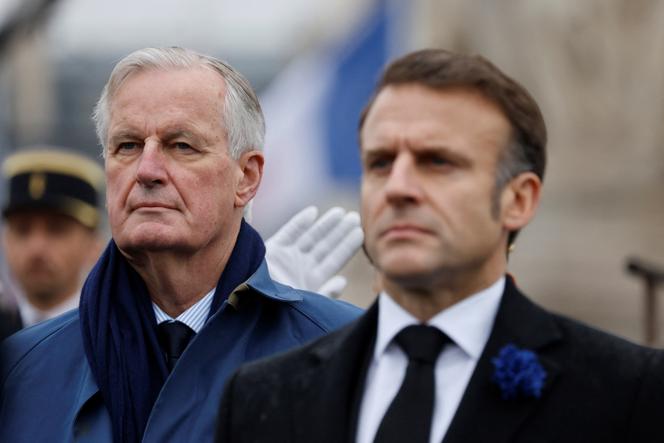


Emmanuel Macron was on a plane to Riyadh, the capital of Saudi Arabia, when his prime minister, Michel Barnier, called him late in the morning of Monday, December 2, to warn him that he would be forcing his social security budget without a vote, thus exposing his government to a motion of no-confidence. The Elysée seemed taken by surprise by the new political situation, as the French president would only be returning from his state visit to the Persian Gulf on Wednesday, the day the first motion of no-confidence, tabled by the left, is due to be put to a vote.
Was Marine Le Pen trying to raise the stakes until the last minute, or was she pursuing a strategy of chaos? At midday, the president's entourage was still questioning the far-right leader's determination to vote with the left to bring down the government. If Le Pen votes for it, "she cuts herself off from the very electorate that would enable her to break the glass ceiling in 2027," predicted a source close to Macron. The element of doubt was lifted in the afternoon, when Le Pen said she would vote for the left's motion of no-confidence.
This opened up a political crisis that precipitated the return of the president to the front line. In front of the cameras at the Assemblée Nationale, Le Pen herself set out the three "constitutional levers" available to the president to respond to the crisis: Dissolution, "but he has already used it" and cannot resort to it again "before next June;" a reshuffle, "but we can question its usefulness, at a time when the government could only be in a minority;" and finally, "his own resignation."
Radical-left La France Insoumise (LFI) leader Jean-Luc Mélenchon, for his part, has been theorizing for months about deposing Macron. "If Michel Barnier's government falls, I think the question that will be asked, in truth, is that of the departure of the president of the Republic," his lieutenant Manuel Bompard asserted on CNews television channel on Sunday. Last week, Bompard sent a letter to Interior Minister Bruno Retailleau, asking him to specify the "organizational arrangements" for an early presidential election and expressing particular concern about the tight deadlines set out in the Constitution.
The Socialists, on the other hand, have not called for the president to resign. "Unlike LFI, we don't have any fantasies about Macron resigning," insisted the president of the PS group in the Senate, Patrick Kanner. On the other hand, last week saw centrist Charles de Courson, general rapporteur for the budget, pleading for an early presidential election. As did the Les Républicains (LR) figure Jean-François Copé, who, after long campaigning for an alliance between LR and Macron's party Renaissance, is now calling for the president to resign. "Because of the original sin of dissolution, everything is now blocked, no law can pass," warned the former budget minister.
You have 52.62% of this article left to read. The rest is for subscribers only.
